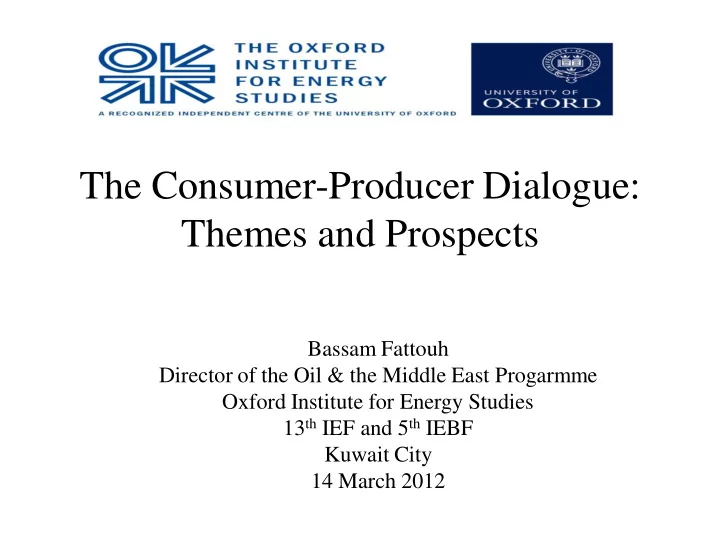

The Consumer-Producer Dialogue: Themes and Prospects Bassam Fattouh Director of the Oil & the Middle East Progarmme Oxford Institute for Energy Studies 13 th IEF and 5 th IEBF Kuwait City 14 March 2012
Main Themes • Theme 1: Oil price stability • Theme 2: Physical disruptions and energy security • Theme 3: Spare capacity • Theme 4: Investment in the energy sector • Theme 5: Role of signalling and shaping market participants‟ expectations
Oil Price Stability • Wide Range within which the oil price can clear • Low oil prices – Undermines security of supply – Cycle of underinvestment – Undermines political and social stability – Undermines conservation and climate change agenda • High oil prices – Undermines security of demand – Slowdown in global economic growth & global imbalances – Oil demand reduction
Oil Price Stability • Producers and consumers have interest in keeping oil price stable within a range whose lower boundary not too low or upper bound not too high • What is too high or too low? • Market or other mechanisms • Divergent interests • How to bridge short term interests with long term interests?
General Statements • “reduce price volatility in the interests of producers and consumers” because volatility “complicates the interpretation of market signals and may adversely affect investment” • “both producer and consumer countries...to take action to reach sustainable price levels” • “ oil prices should be at levels that are acceptable to producers and consumers to ensure global economic growth, particularly in developing countries ” • Does failure to bargain about price levels or to manage price level within bounds mean that producer-consumer dialogue has failed? No!!!
Physical Disruptions • Supply disruption caused by Gulf War in 1990-1991 proved to be decisive as it increased awareness and revealed usefulness of coordinating actions in key areas such as use of stocks and spare capacity • Libyan disruption in 2011 put serious strains on consumer- producer and producer-producer relations
Spare Capacity • Maintaining spare capacity responsibility of consumers as well as producers and extending to the entire supply chain • Complex issues surrounding spare capacity: – Does spare capacity constitute a global public good? – Should all parties share the cost of maintaining spare capacity?
The Investment Issue • Recurring theme in most IEF Ministerial meetings • Asymmetry • „favourable energy, fiscal, investment and environmental relations‟ • Agenda broadened – Reduce long-term uncertainty – Enhance corporation between NOCs, IOCs and SC – Broaden cooperation and exchanges in fields of human capital and technology advancement
Signalling • Stabilise market participants‟ longer -term expectations about a range of oil prices which both parties consider acceptable • If anticipated government responses are slow, or are perceived to be absent on either the demand or supply side.
Milestones • Consumers and producers have overcome some of their past myths, fears and suspicions and have become more aware of a number of common challenges facing energy markets • Institutional structure supporting dialogue continues to strengthen • Structure and quality of the dialogue improved over years • Establishment of the Joint Oil Data Initiative (JODI).
Challenges • Avoid confrontational topics & focused more on themes that can bring them closer together • Long-run risk of key issues that lie at the heart of consumers‟ and producers‟ concerns becoming marginalised • Greater understanding of nature of the investment problem but concrete initiatives to alleviate the investment constraints remain limited
Recommend
More recommend